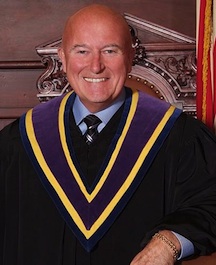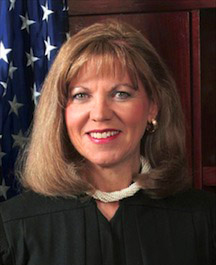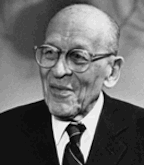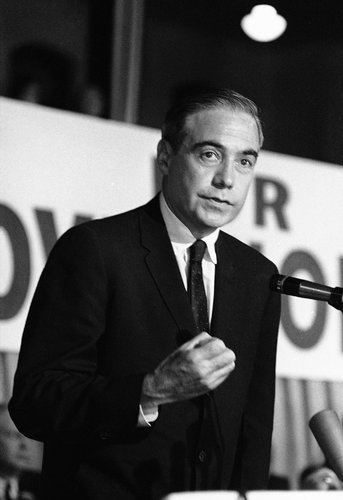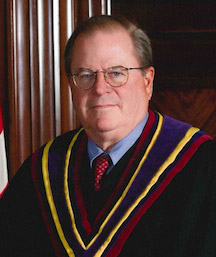Pennsylvania judges make
million dollar pay grab
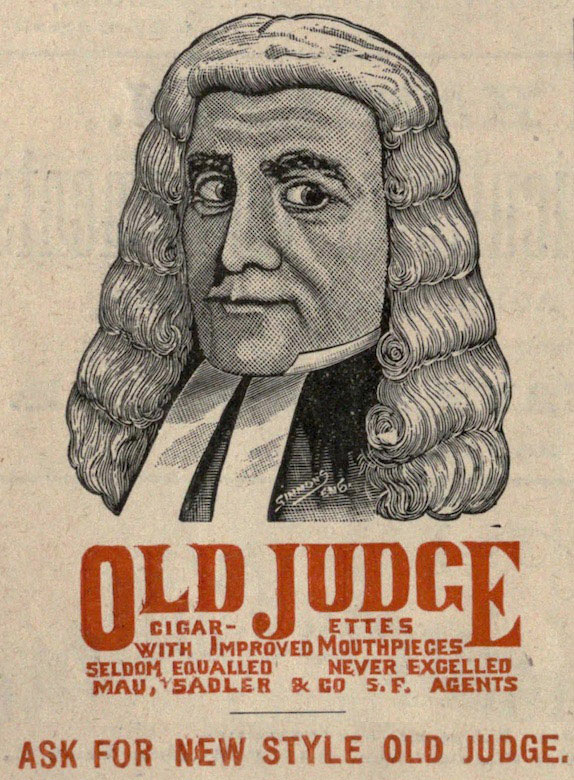
If old judges are so wise, why can’t they clean up Pennsylvania courts?
Pennsylvanians have been well served and protected in recent decades by a hard-won constitutional reform requiring all state judges retire at age 70.
But some Pennsylvania judges are working hard to do away with this needed protection.
State judges want to extend their terms in office to give themselves a windfall of salary and benefits worth upwards of a million dollars, despite the express wishes of the framers of the Pennsylvania constitution and state voters.
Whether state judges get away with their latest money and power grab remains to be seen. But they’ve already gotten away with a lot.
In recent years Pennsylvania courts have been mired in unending turmoil of disgrace, scandal, and political adventurism. But you wouldn't know that to listen to the propaganda of the state courts.
“This commonwealth,” the state Supreme Court relates in a 1999 pamphlet, “has developed a strong tradition of fair and equal justice for all and protection of individual human dignity.”
But these days Pennsylvania state courts and judges seem unable to protect even their own dignity, let alone protect the dignity and rights of everyday Pennsylvanians, as they are charged by our constitution to do.
The dismal record of the state supreme court alone speaks volumes.
In recent years three Supreme Court justices have been removed for criminal activities or other unseemly misbehavior, making it perhaps the most corrupt and out-of-control institution in the state, and that’s saying a lot.
Justice Rolf Larsen was impeached in the 1990s after he suggested case fixing and politics were rampant on the high court; rather than investigating Larsen’s allegations, two special prosecutors and a grand jury were empanelled to go after Larsen, who himself was found to have illegally obtained prescription drugs while he sat around his chambers in a jock strap and ate chilled fruit salad, and fixed cases with a lawyer who also happened to head one of the court’s disciplinary boards.
Corruption on the top bench: Former Pennsylvania Supreme Court Justices Seamus McCaffery (top) and Joan Orie Melvin.
|
|
Justice Joan Orie Melvin resigned in disgrace in 2013 after she was convicted of using state workers to help her get elected to the high court.
Just a few months ago, Justice Seamus McCaffery was forced out after an investigation by state Attorney General Kathleen Kane revealed he’d sent more than four hundred pornographic emails to an unknown number of state prosecutors, criminal investigators and others.
The most recent and ongoing state court scandal concerns whether old-boy judges and their porno-sharing lawyers are playing politics by retaliating in secretive star-chamber proceedings against AG Kane for her discovery of those same porno emails, in a political effort to force her to resign and drive her from office.
Other misbehaving state judges in recent years have been protected by a non-existent, self-policing, and highly politicized disciplinary system.
Even before this latest litany of appalling scandals, Pennsylvanians for Modern Courts points out, a “ blue-ribbon panel of civic leaders, public officials, legal professionals and members of the judiciary commissioned by Governor Casey and chaired by then-Superior Court Judge Phyllis W. Beck, found that confidence in the judiciary was appallingly low.”
With a record, and public condemnation, like this, one would imagine our judges would understand they better get their act together and behave themselves in and out of the courtroom, and stop grabbing for even more power, political Machiavellianism, and perks.
But no such luck.
This generation of Pennsylvania judges seem hell bent not on looking out for the little guy and every day Pennsylvanians, but looking out for the big guys, and themselves.
The requirement that judges retire at 70 was a critical and hard-fought reform dating back to the state’s constitutional convention of the 1960s.
But now the judges and their proxies are back in the state legislature asking that even this protective constitutional requirement be thrown out.
A bill sponsored by state Rep. Kate Harper (R-Montgomery) to raise the mandatory retirement age of state judges to 75 has made it out of committee and will soon be voted on by the full house, and passed on to the senate.
Identical legislation was passed in October 2013 in both the state house and senate. To make it on to the ballot to change the constitution, both houses must pass a proposed amendment in two consecutive legislative sessions. The governor is not required to sign.
If the current bill makes it through the general assembly and the senate this session, voters could be greeted with a question at the polls as early as this November to raise the mandatory retirement age of judges to 75.
And that prospect gives rise to a variety of issues that should be of concern to all Pennsylvanians.
Raising the retirement age to 75 by way of a constitutional amendment amounts to a power and money grab, and deserves stern public disapproval and condemnation, and denial of the initiative.
First, there’s the money.
State judges currently draw a salary of up to $195,000 a year. So five more years means some of these judges -- many who are retired politicians and aren’t even competent lawyers who could cut it in private practice -- will be taking in almost a cool million feeding at the public trough.
But the money is the least of what we should be worried about.
Constitutional convention intent:
retiring judges at 70 as modern court reform
The current provision that state judges must retire at 70 came out of Pennsylvania’s constitutional convention of 1967-68.
Say what you will about the state’s constitutional convention of ’67-68, it wasn’t entirely composed of political hacks and upwardly mobile township supervisors, as we evidently see in today’s partisan state legislature.
Delegates to the convention included luminaries like author and state native James Michener, and former Gov. Bill Scranton. During his tenure as governor in the early 1960s, Scranton spent considerable political capital pushing for a convention to modernize state government.
As the Pennsylvania Bar Association recounts:
“At the beginning of the twentieth century it became obvious that there were serious problems with the Constitution of 1874, and that it was insufficient to meet problems of the new century. As a result, a succession of governors campaigned on the issue of constitutional reform and sought to convene constitutional conventions. Between 1900 and 1968, the voters defeated no less than six proposals for constitutional conventions to revise the Constitution.
“In the 1950’s calls for a revision of the constitution were widespread. A succession of governors and attorneys general, the Pennsylvania Bar Association, some members of the legislature, and numerous nonprofit organizations joined the call for a limited constitutional convention. In 1967 the voters approved the call for a limited constitution convention. It was held in 1967-1968, and the convention proposals were approved by the voters in 1968.”
The 1967-68 convention’s clear intent in inserting the mandatory retirement of judges at age 70 was to give the public a mechanism to remove from the bench judges who had stayed on too long and to limit the sort of political and judicial chicanery we see today.
Documents and testimony from the convention make this abundantly clear.
Prominent in the call for the mandatory retirement of judges at 70 was Pennsylvania lawyer and state bar association member Bernard Segal.
Bernard Segal: Champion of the little guy, advocate of merit selection of judges, and mandatory retirement of judges at 70. |
|
Segal was known for his tireless work for the little guy. He worked in the civil rights movement, and was an early advocate of providing lawyers for the indigent. Segal was known as the nation’s foremost advocate for the merit selection of judges. In the 1950s Segal persuaded President Dwight Eisenhower to submit the names of prospective judicial nominees to the American Bar Association for review and recommendations, a practice that continues to this day. He convinced U.S. Attorney General Robert Kennedy and President John Kennedy to marshal lawyers to help with the civil rights movement. In the 1950s he was elected chancellor of the Philadelphia Bar Association, and in 1969 would become president of the American Bar Association.
Segal was a driving force behind the judicial reforms of the Pennsylvania constitutional convention of 1967 and 68, and the call to retire state judges at the age of 70.
“It is regrettable, but grimly true, that one bad judge can undo the efforts of a hundred excellent judges,” Segal told the state constitutional convention’s Preparatory Committee in 1967. “...(E)ven a very few unfit judges constitute a serious impediment to the efficient administration of justice. In Pennsylvania today, we have a single method of removal (of judges), i.e., impeachment.”
But impeachment isn’t very practical, Segal pointed out. “One need not delve very deeply into the virtually complete nonuse of the impeachment process for the removal of members of the judiciary, or of the problems which would be created for the General Assembly, if it had to sit, first as an impeaching body in the House, and second as a convicting body in the Senate, to realize this vehicle is virtually worthless to meet the problems created by the aged, the inform, or even the corrupt judge.”
Nowhere did Segal use the word senile. Instead, the mandatory retirement age of 70 was part of a sweeping proposal to make our courts modern and impartial, and youthfully efficient, without political entanglements and chicanery.
Segal told the committee in 1967, “If I were asked to summarize in a single sentence the objectives and provisions of the proposed Article, I would say that it creates a modern, integrated, unified judicial system, in which judges will be freed of political involvement and will be enabled to conduct their judicial duties with a maximum of independence and efficiency.” (Emphasis mine.)
The proposed changes of the 1960s constitutional convention grouped the mandatory retirement age of 70 into a category labeled, “Judicial Removal, Discipline and Compulsory Retirement.” In short, it was about creating much-needed mechanisms to get rid of these guys, and their entrenched power bases, which, left unchecked, play havoc on the political and judicial establishments, as we see today.
It was about limiting politics in the courts, and eliminating the old-boy power brokers from the bench so we could concentrate on, as Segal would say, justice for all, and not court-ordered politics for a few entrenched insiders.
The proposal to retire judges at 70 wasn’t controversial at the state constitutional convention. It seemed to delegates necessary, common sense, and altogether reasonable. Mandatory retirement at 70 was not only backed by the state Bar Association, but delegates at the convention, and state voters who overwhelmingly approved the constitutional changes at the polls in 1968.
(What was and continues to this day to be controversial was Segal’s call for merit selection of judges in Pennsylvania, which ultimately was defeated by state voters at the polls in 1969 by a narrow vote of 643,960 to 624,453. The appointment of judges in Pennsylvania was a practice dating back to founder William Penn. “The judicial appointive system came under attack during the administration of President Andrew Jackson (1829-1837), amid the growing sentiment that all governmental office holders should be accountable to the voters and therefore elected,” Pennsylvanians for Modern Courts tells us. In the 1800s the state constitution was changed to elect judges. Since then, the election of judges has been very hard to end.
Former governor and convention delegate Bill Scranton: ‘Retirement is called for at the age of 70 for everybody.’ |
|
|
Delegate Bill Scranton, a member of the convention’s judiciary committee, described the debate over merit selection versus the election of judges as, “by all odds, ... the most contentious and the most contested of all the portions of (the judiciary) article within the committee.” Delegate William Stout added that the election of judges and its attendant politics was “the hottest, most controversial issue of this convention.”)
Unlike the defeated merit selection proposal, the mandatory retirement of judges at 70 was not very controversial at all among the convention’s forward-thinking delegates. Everyone seemed to understand that old judges gathered moss, and fostered political entanglements and judicial trouble.
Scranton called the new changes to the judiciary, including mandatory retirement of judges at age 70, “revolutionary,” “a new modern era for our judicial system,” and among the most progressive in the nation.
“Retirement is called for at the age of 70 for everybody,” Scranton pithily summarized this judicial reform at the convention.
Despite these hard-fought reforms by convention delegates, and the subsequent ratification of these reforms by voters at the polls, today’s judges want us to forget all that.
In this year’s pitch on behalf of Rep. Kate Harper’s bill to extend the retirement age of judges to 75, the proponents of eliminating the 70-and-out clause essentially make a spurious argument that people don’t go senile at 70 these days like they used to.
The same argument was made in an unsuccessful 2012 federal lawsuit filed by six state judges. In their failed federal lawsuit, the Pennsylvania judges went so far as to argue that they are entitled by “the inherent rights of mankind” to stay on as long as they desire, or until they can no longer drag themselves across the floor to the bench, whichever comes first.
This and another, recent state court challenge to the mandatory-retirement-at-70 clause were defeated at the bar (meaning, in the courtroom, not in a bar room, as some might suppose by the misbehavior of today’s jurists). If you want to stay longer, commonwealth attorneys told the courts, judges should get the legislature to change the state constitution.
In a brief filed in the 2013 state court challenge, commonwealth attorneys wrote, “A judge has no more right to serve beyond the time set by the Constitution than a governor has a right to seek a third term.”
This two-term limit for governors was also set by the 1960s convention to limit the power of the executive, the same as the judges’ careers were limited. It was all about defining and limiting powers, as constitutions usually are.
But this hasn’t stopped today’s judges from trying to grab more political influence and money with time on the bench, against the express wishes of the framers.
Enter Rep. Kate Harper
Today’s advocates of extending the retirement age of Pennsylvania judges to 75 intentionally ignore the political influence and corruption issues of the proposal, and instead try to change the conversation to medical issues.
In early 2015, Rep. Harper, who herself is an attorney, told the House Judiciary Committee that people live longer these days, and so can stay on the job longer.
State Rep. Kate Harper: makes medical argument, ignores corruption and influence issues. |
|
Governors probably live longer too, but that hasn’t caused them to go running to the legislature to apply for a third term. (Gov. Ray Shafer, sitting governor at the time of the 1967-67 constitutional convention, was himself grandfathered out of the new constitution’s two-term change, and could only serve one term. Nothing in today’s proposal we should note would exempt current sitting judges from serving until 75, in a similar fashion that applied to Gov. Shafer.)
In a related committee hearing in 2013, the House Judiciary Committee even trotted out a doctor to testify that “there is no sharp decline of mental functioning between age 70 and 75 and the prevalence of dementia was relatively small,” the Pennsylvania Record recently reported.
So, what are they suggesting, that we’ve cured Alzheimer’s? If so, someone in the Pennsylvania legislature should call the American Medical Association to share the happy news.
Proponents also argue that old judges bring wisdom. If old judges are so wise, why can’t they clean up Pennsylvania’s courts?
Of course that’s all a ruse, to provide cover for this blatant political power and money grab.
And it’s beside the point. In fact it’s not even the point at all.
One need only look at the dismal and pathetic public record of former Chief Justice Ron Castille, who faced mandatory retirement this January, to understand the real point, and the real concern of the framers of our state constitution.
Chief Justice Ron Castille: mandatory retirement-at-70 provision had thankfully worked. |
|
Castille presided over one of the most politically corrupt eras of our courts in state history. Under Castille and his immediate predecessors, for just one notorious example, 6,500 kids were sold down the river in Luzerne County over the course of years in the Cash for Kids scandal, without proper court hearings, or even lawyers, by judges bribed on behalf of a private detention facility that was co-owned by the son of another chief justice, Stephen Zappala.
Lawsuits filed by Common Cause Pennsylvania and the League of Women Voters in the 2000s accused Castille and his cohorts, the late Chief Justice Ralph Cappy, and current Justice Michael Eakin, of politicking and horse trading with state legislators and Ed Rendell’s governor’s office for judicial pay raises in return for court approval of legalized casino gambling.
In that memorable episode, the government reform groups reported that one legislator identified as House Member A, “had run into Justice (Ronald) Castille at the Golden Sheaf restaurant at the Harrisburg Hilton Hotel and inquired about the Act 71 (casino) Litigation, to which Justice Castille gave a ‘wink and a nod’ to House Member A which he/she interpreted as clearly indicating and communicating that Act 71 would be held constitutional.”
With Castille, over the years, the scandals just kept coming. In 2010 he was caught channeling $12 million in a no-bid fashion to a golf buddy for the construction of a family court building in Philadelphia.
In a political flap with Attorney General Kane last year, Castille demanded the AG’s office turn over the aforementioned porno emails from an ongoing criminal investigation controlled by Kane’s executive branch.
Castille further blatantly violated the constitutional separation of powers of the judicial and executive branches by signing off on a questionable court-appointed prosecutor to go after AG Kane. This blatant chicanery and monkey business involving serious breaches of separation of powers for reasons of political skullduggery are at the heart of Kane’s current appeal before the court.
Lucky for us all, come this past January, thanks to our current constitution, Castille and his tainted brand of politics were booted off the court, as he turned 70 last year.
Those involved in our constitutional convention in the 1960s would be gratified, and pleased.
In Castille’s case, their mandatory retirement provision had thankfully worked.
If Rep. Harper had gotten her way earlier, we would have been helplessly saddled with Ron Castille and his political turmoil for another five years.
Under Ron Castille and his cronies our courts have degenerated into just another entitlement class, looking out for themselves, and their pals.
The mandatory retirement of judges at 70 is the only practical measure that has managed to protect the victimized citizens of Pennsylvania from further endless monkey business from at the hands of scandal-plagued judiciary, and wannabe politicians like Ron Castille.
Pennsylvanians should say no to this latest power and money grab.
This sense of entitlement, power mongering and yes, personal greed, by these self-obsessed lawyers on our courts is what deserves our sternest disapproval.
Real respect is earned, and is not handed out with a black robe and a gavel, as they insist.
It’s time Pennsylvania judges again get respect and distinguished careers the old fashioned way: they should earn it.
- Bill Keisling
posted March 5, 2015

